Best Business Balance Transfer Cards in 2026: Grow Your Business, Not Your Interest
Winner: Best business credit card for balance transfers
Winner: Best business credit card for balance transfers
PNC Visa® Business Credit Card
The PNC Visa® Business Credit Card is a standout if your business needs to tackle lingering credit card debt. Along with offering a long interest-free period on balance transfers and a $0 annual fee, it’s one of the rare business balance transfer cards backed by a major bank, not just a local credit union.
Key takeaways
- For entrepreneurs juggling high-interest debt or cash flow hiccups, a business balance transfer credit card can be a real lifeline.
- These cards offer 0% intro APRs for an extended period of time, allowing you to focus on paying off your principal balance instead of drowning in interest charges.
- Although business balance transfer cards typically charge a 3% to 5% fee for each balance transfer, that’s a small price to pay compared to what you’ll save on interest.
- Winner: Best business credit card for balance transfers: PNC Visa® Business Credit Card
- Managing business expenses: U.S. Bank Business Platinum Card
- Rewards in popular business categories: U.S. Bank Triple Cash Rewards Visa® Business Card
- Business insurance rewards: State Farm Business Cash Rewards Visa Signature Card
- Gas rewards: First Citizens Bank Rewards Business Visa
- Variety of cash back categories: Huntington Voice Business Credit Card
- Simple, flat-rate cash back: Fifth Third Simply Business Card
- Generous, flat-rate points: PNC points Visa Business Credit Card
- East Coast business owners: M&T Business Credit Card
- Pacific Northwest business owners: Columbia Bank Visa® Business Card
- Southeast U.S. business owners: Synovus Business Visa® Credit Card
- Texas, Colorado and Utah business owners: Power Business Travel Rewards Credit Card
- Oklahoma and Texas business owners: IBC Bank Business Edition Visa Card with Reward Simplicity
Compare the best business credit cards for balance transfers
| Credit Cards | Our Ratings | Intro Balance Transfer APR | Regular Balance Transfer Rate | Balance Transfer Fee | |
|---|---|---|---|---|---|

PNC Visa® Business Credit Card*
|
Winner
|
0% Intro APR on balance transfers for 13 billing cycles | 16.24% to 26.24% Variable | Either $5 or 5% of the amount of each balance transfer, whichever is greater. | |

U.S. Bank Business Platinum Card*
|
Managing business expenses
|
0% intro on balance transfers for 12 billing cycles | 16.24% - 25.24% Variable | Either 5% of the amount of each transfer or $5 minimum, whichever is greater. | |

U.S. Bank Triple Cash Rewards Visa® Business Card*
|
Rewards in business categories
|
0% intro on balance transfers for 12 billing cycles | 17.24% - 26.24% Variable | Either 5% of the amount of each transfer or $5 minimum, whichever is greater. | |
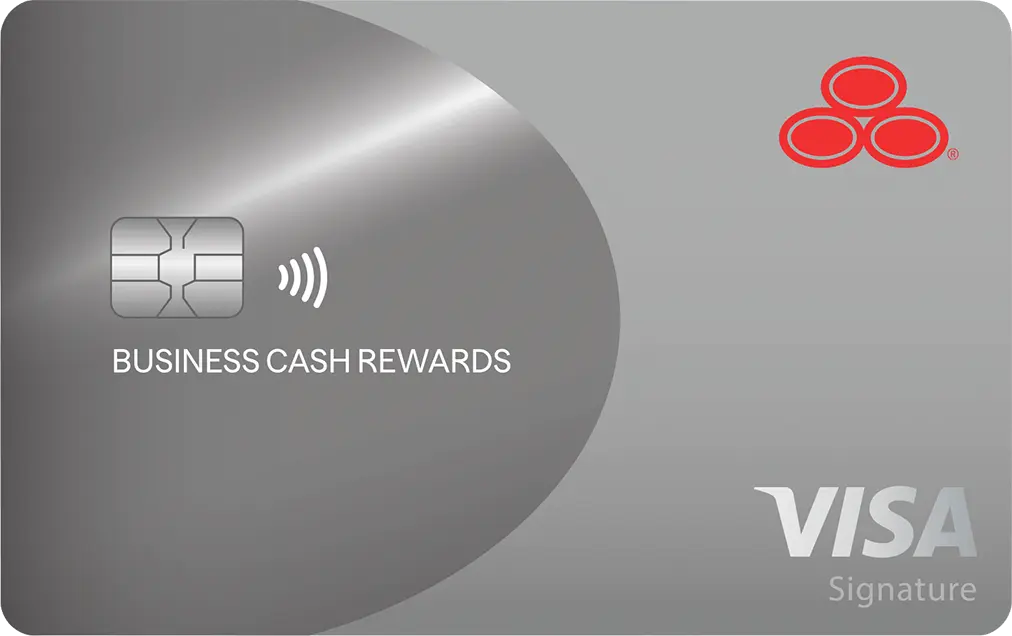
State Farm Business Cash Rewards Visa Signature Card*
|
2.7
Business insurance rewards
|
0% intro APR for 12 billing cycles | 17.49% to 26.49% Variable | Either 3% of the amount of each transfer or $5 minimum, whichever is greater | |
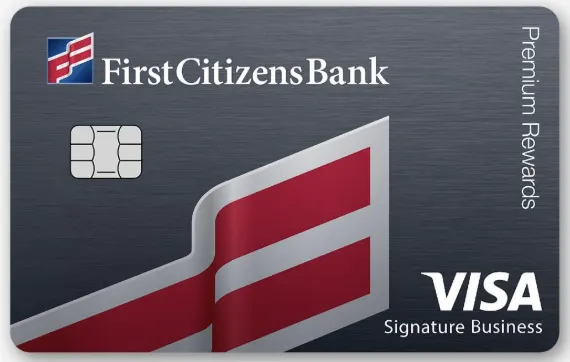
First Citizens Bank Rewards Business Visa*
|
1.0
Gas rewards
|
0% intro APR for 9 months | 15.74% to 24.74% Variable | Either $5 or 3% of the amount of each transfer, whichever is greater | |

Huntington Voice Business Credit Card*
|
2.0
Variety of cash back categories
|
0% intro APR for 12 billing cycles | 15.24% - 26.24% Variable | The greater of $10.00 or 3% of the amount of each Balance Transfer | |

Fifth Third Simply Business Card*
|
1.7
Simple, flat-rate cash back
|
0% intro APR for 12 billing cycles | 15.74% to 26.74% Variable | Either $5 or 4% of the amount of each transfer, whichever is greater | |
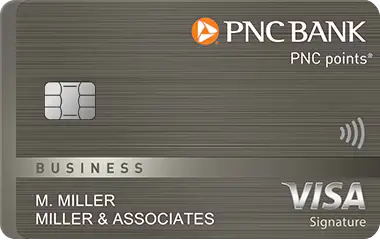
PNC points Visa Business Credit Card*
|
1.4
Generous, flat-rate points
|
0% intro APR for 9 billing cycles | 19.24% to 28.49% Variable | Either $5 or 5% of the amount of each balance transfer, whichever is greater | |
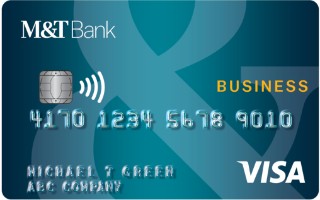
M&T Business Credit Card*
|
1.3
East Coast
|
0% intro APR for 12 billing cycles | 13.99% - 20.99% Variable | 4% of each balance transfer (minimum $10) | |
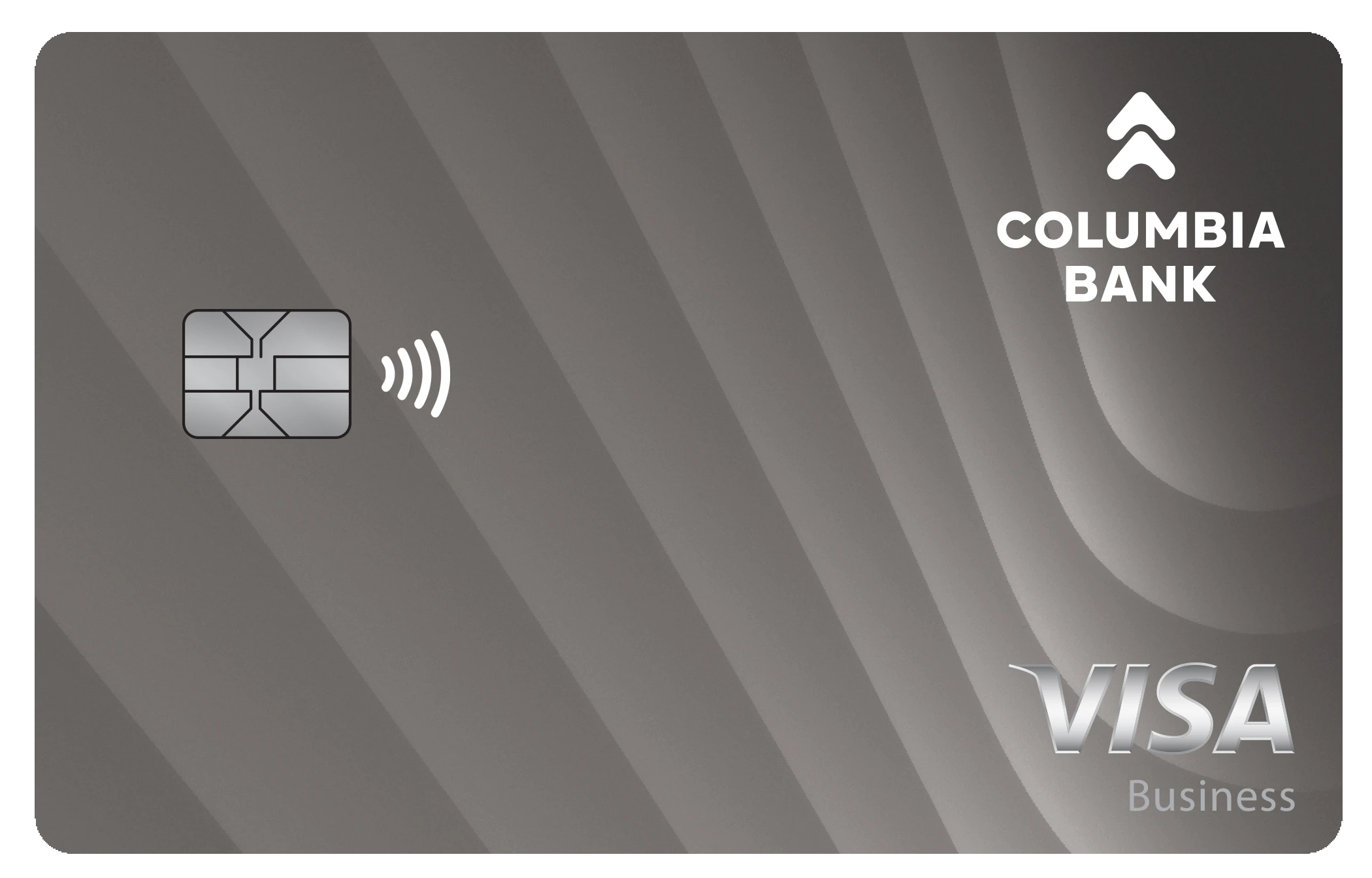
Columbia Bank Visa® Business Card*
|
3.5
Pacific Northwest
|
0% introductory APR for the first 18 billing cycles on balance transfers | 16.24%-25.24% variable | 3%, or $5 minimum for the first 558 days from account opening, followed by 5% or $5 minimum | |

Synovus Business Visa® Credit Card*
|
0.7
Southeast U.S.
|
0% intro APR for 6 months | 12.99%-24.99% Variable | $0 | |
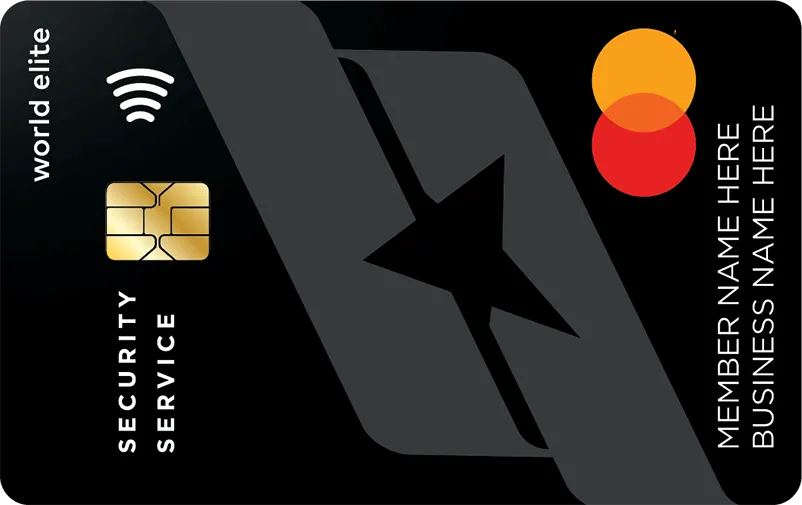
Power Business Travel Rewards Credit Card*
|
3.3
Texas, Colorado and Utah
|
0% Intro APR for 180 days on balance transfers | 7.90% | 0% for the first 180 days, then 3% | |
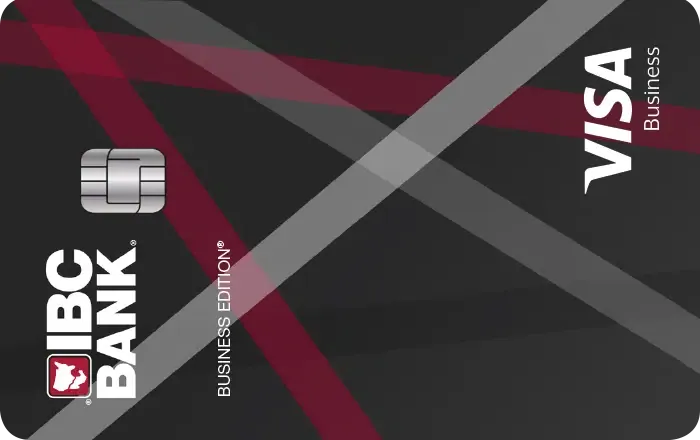
IBC Bank Business Edition Visa Card with Reward Simplicity*
|
1.0
Oklahoma and Texas
|
0% intro APR for 6 billing cycles | 21.49% to 28.99% Variable | Either $10 or 5% of the amount of each transfer, whichever is greater |
Methodology: How we chose the best business balance transfer credit cards
We take a comprehensive, data-driven approach to identify the best business balance transfer cards. We use an objective rating and ranking system that evaluates over 200 credit cards from more than 50 issuers. All recommendations are made by LendingTree’s editorial team, completely independent of affiliate partnerships or compensation. Every card is selected based on its merit and ability to help people achieve their financial goals. We use the following criteria to make our picks:
We calculate the amount you’ll save on a balance transfer, based on the length of the introductory period. We assume a transfer amount of $6,000 and a monthly payment of $300. We subtract balance transfer fees, annual fees and the amount paid on interest for any amount left over after the introductory period expires.
We also consider the yearly value in rewards for the average cardholder, minus the card’s annual fee. For non-rewards cards, this value will be $0, or less than $0 if the card charges an annual fee.
Winner: Best value for business balance transfers
PNC Visa® Business Credit Card*

How LendingTree Rates Credit Cards?
Our experts rate credit cards based on several factors including card benefits, bonus offers and independent research. Credit card issuers do not influence or have a say in our card ratings. Read our credit card methodology here.


How LendingTree Rates Credit Cards?
Our experts rate credit cards based on several factors including card benefits, bonus offers and independent research. Credit card issuers do not influence or have a say in our card ratings. Read our credit card methodology here.Intro offer savings: $865*
*Based on LendingTree’s value methodology
- Long intro APR on balance transfers and purchases
- $0 annual fee
- Potentially low ongoing APR (16.24% to 26.24% Variable)
- Easy to manage through online account tools
- No rewards program or sign-up bonus
- 3% foreign transaction fee
- High penalty APR (33.24% variable)
- Balance transfer fee
The PNC Visa® Business Credit Card is our pick for the best credit card for a business balance transfer because it offers one of the longest interest-free periods on balance transfers currently available for a business credit card. You can get a 0% Intro APR on balance transfers for 13 billing cycles and a potentially low ongoing APR of 16.24% to 26.24% variable after that.
Plus, you’ll have 90 days to transfer your balance and take advantage of the introductory APR, which is longer than many cards.
- 0% intro APR on balance transfers for 13 months, after which a 16.24% to 26.24% Variable APR applies
- Set spending limits on employee cards
- No annual fee
Managing business expenses
U.S. Bank Business Platinum Card*

How LendingTree Rates Credit Cards?
Our experts rate credit cards based on several factors including card benefits, bonus offers and independent research. Credit card issuers do not influence or have a say in our card ratings. Read our credit card methodology here.


How LendingTree Rates Credit Cards?
Our experts rate credit cards based on several factors including card benefits, bonus offers and independent research. Credit card issuers do not influence or have a say in our card ratings. Read our credit card methodology here.Intro offer savings: $846*
*Based on LendingTree’s value methodology
- Long intro APR on balance transfers and purchases
- $0 annual fee
- Reasonable ongoing APR (16.24% - 25.24% Variable)
- Spend management tools
- No rewards program or sign-up bonus
- Foreign transaction fee (3% of each foreign transaction)
- Limited benefits
The U.S. Bank Business Platinum Card is the best choice for managing business expenses because it offers a generous 0% intro on balance transfers for 12 billing cycles, followed by a competitive 16.24% - 25.24% Variable APR.
Plus, it has a $0 annual fee and built-in tools to help you manage your business spending. This includes card controls to monitor when and how employees use their cards, the option to pay over time with a U.S. Bank ExtendPay® Plan and access to the U.S. Bank spend management platform.
- 0% Intro APR on purchase and balance transfers for 12 billing cycles. After that, a variable APR currently 16.24% - 25.24%.
- Save on interest when you transfer balances from higher rate credit cards.
- Take control of your card spend with U.S. Bank Spend Management—a game-changing platform for monitoring and managing business expenses and employee spending.
- No annual fee.
- Terms and conditions apply.
Rewards in popular business categories
U.S. Bank Triple Cash Rewards Visa® Business Card*

How LendingTree Rates Credit Cards?
Our experts rate credit cards based on several factors including card benefits, bonus offers and independent research. Credit card issuers do not influence or have a say in our card ratings. Read our credit card methodology here.


How LendingTree Rates Credit Cards?
Our experts rate credit cards based on several factors including card benefits, bonus offers and independent research. Credit card issuers do not influence or have a say in our card ratings. Read our credit card methodology here.Intro offer savings: $835*
*Based on LendingTree’s value methodology
- Long intro APR on purchases and balance transfers
- Earns 1% - 5% cash back on purchases
- $0 annual fee
- Annual credit for software subscription expenses
- Foreign transaction fee (3% of each foreign transaction)
- Restrictions on earning the higher cash back rate at gas and EV charging stations
The U.S. Bank Triple Cash Rewards Visa® Business Card is a standout choice for earning rewards on everyday business spending — something many business balance transfer cards don’t offer. You’ll earn cash back on eligible purchases in key business categories like gas, office supply stores, cell phone providers and restaurants. Plus, you’ll get an annual credit for eligible recurring software subscriptions.
The card also has a lengthy 0% intro on balance transfers for 12 billing cycles (then 17.24% - 26.24% Variable APR), making it a strong option for managing debt while earning cash back on regular expenses.
- Earn $750 in cash back. Just spend $6,000 on the Account Owner's card in the first 180 days of opening your account.
- Earn 3% cash back on eligible purchases at gas and EV charging stations (transactions of $200 or less)*, office supply stores, cell phone service providers and restaurants (*excludes discount stores/supercenters and wholesale clubs).
- 1% cash back on all other eligible purchases.
- Earn 5% cash back on prepaid hotels and car rentals booked directly in the Travel Center when using your card.
- Take control of your card spend with U.S. Bank Spend Management—a game-changing platform for monitoring and managing business expenses.
- No limit on total cash back earned.
- Redeem Cash Rewards right away or save them for later. Cash Rewards do not expire as long as the account remains active.
- Earn an annual $100 statement credit for recurring software subscription expenses such as FreshBooks or QuickBooks.
- Terms and conditions apply.
Business insurance rewards
State Farm Business Cash Rewards Visa Signature Card*

How LendingTree Rates Credit Cards?
Our experts rate credit cards based on several factors including card benefits, bonus offers and independent research. Credit card issuers do not influence or have a say in our card ratings. Read our credit card methodology here.


How LendingTree Rates Credit Cards?
Our experts rate credit cards based on several factors including card benefits, bonus offers and independent research. Credit card issuers do not influence or have a say in our card ratings. Read our credit card methodology here.Intro offer savings: $955*
*Based on LendingTree’s value methodology
- Long intro APR on purchases and balance transfers
- Cash back on insurance premium payments and other popular business categories
- $0 annual fee
- Annual software subscription credit
- Auto deductible reimbursement
- Cell phone protection
- No sign-up bonus
- Cap on insurance premium rewards
The State Farm Business Cash Rewards Visa Signature Card offers the unique opportunity to earn cash back on insurance premium payments, along with rewards on other common business expenses.
It also comes with a solid 0% intro APR for 12 billing cycles on balance transfers, followed by an 17.49% to 26.49% Variable APR.
- 3% cash back on insurance premium payments, up to $4,000 spent annually.
- By applying directly through a State Farm agent, earn up to 5% cash back on insurance premium payments for the first year.
- 3% cash back at gas stations and electric vehicle charging stations (transactions $200 or less), cell phone service providers, office supply stores and on dining.
- 1% cash back on all other purchases.
- $100 annual software subscription credit.
Gas rewards
First Citizens Bank Rewards Business Visa*

How LendingTree Rates Credit Cards?
Our experts rate credit cards based on several factors including card benefits, bonus offers and independent research. Credit card issuers do not influence or have a say in our card ratings. Read our credit card methodology here.


How LendingTree Rates Credit Cards?
Our experts rate credit cards based on several factors including card benefits, bonus offers and independent research. Credit card issuers do not influence or have a say in our card ratings. Read our credit card methodology here.Intro offer savings: $787*
*Based on LendingTree’s value methodology
- Earns 1 - 3 points on purchases
- Sign-up bonus
- $0 foreign transaction fees
- Cellphone protection
- This card is only available in select states
- Some users have noted customer service frustrations
The First Citizens Bank Rewards Business Visa is best for gas rewards because you’ll earn 3 points for every $1 spent on gas, 2 points for every $1 spent at restaurants and on travel and redeem 1 point for every $1 spent on all other purchases. Plus, you’ll get a 0% intro APR for 9 months on balance transfers, followed by a 15.74% to 24.74% Variable APR.
Although the intro APR on balance transfers is shorter than some of the other cards on our list, this card is a good choice for businesses looking to earn rewards on fuel while consolidating debt interest-free in the short term.
- Earn 3 points for every $1 spent on gas
- Get 2 points for every $1 spent at restaurants and on travel
- Redeem 1 point for every $1 spent on all other purchases
- Protect your cell phone when you pay your monthly cell phone bill with your First Citizens Business Visa® card
- Earn points faster with employee cards
- Use rewards as statement credits for purchases with our exclusive Pay Me Back redemption option
Variety of cash back categories
Huntington Voice Business Credit Card*

How LendingTree Rates Credit Cards?
Our experts rate credit cards based on several factors including card benefits, bonus offers and independent research. Credit card issuers do not influence or have a say in our card ratings. Read our credit card methodology here.


How LendingTree Rates Credit Cards?
Our experts rate credit cards based on several factors including card benefits, bonus offers and independent research. Credit card issuers do not influence or have a say in our card ratings. Read our credit card methodology here.Intro offer savings: $963*
*Based on LendingTree’s value methodology
- Cash back in a quarterly category you choose
- $0 annual fee
- Unlimited employee cards with spend controls
- No intro APR on purchases
- Quarterly cap on highest cash back earning rate
- Must apply for the card at a Huntington branch
The Huntington Voice Business Credit Card is best for both cash back and balance transfers because it offers a rare combination of reward flexibility and financing benefits. You can earn 4% cash back—on the first $7,000 you spend per quarter, or $28,000 annually. You also earn 1% cash back on all other purchases. If you max out the earning cap each quarter, you can get $1,120 back on those purchases alone each year.
This card also comes with a 0% intro APR for 12 billing cycles on balance transfers, followed by a 15.24% - 26.24% Variable APR.
- 4% cash back in the category you choose.
- If you miss a payment, you get an extra day to pay your minimum payment without receiving a late fee.
- While other banks may charge up to an additional 3% on purchases made outside the United States, Voice cardholders will not have that extra expense.
- Obtain employee cards and set spend controls at no additional cost.
Simple, flat-rate cash back on every purchase
Fifth Third Simply Business Card*

How LendingTree Rates Credit Cards?
Our experts rate credit cards based on several factors including card benefits, bonus offers and independent research. Credit card issuers do not influence or have a say in our card ratings. Read our credit card methodology here.


How LendingTree Rates Credit Cards?
Our experts rate credit cards based on several factors including card benefits, bonus offers and independent research. Credit card issuers do not influence or have a say in our card ratings. Read our credit card methodology here.Intro offer savings: $963*
*Based on LendingTree’s value methodology
- Long intro APR on purchases and balance transfers
- $0 annual fee
- Unlimited cash back on every purchase
- Access to Mastercard benefits
- Must be a Fifth Third checking or savings customer to apply for the card
- No sign-up bonus
- Rewards redemption options are limited
The Fifth Third Simply Business Card is best for flat-rate rewards because you can earn unlimited 1.67% cash back on all purchases. There are no bonus categories or spending caps to worry about, making it a great option for businesses with varied spending. Plus, you’ll get a 0% intro APR for 12 billing cycles on balance transfers, followed by a 15.74% to 26.74% Variable APR. But your business must already bank with Fifth Third to be eligible for the card.
- 1.67% unlimited cash back for every $1 in purchases
- No rotating categories, no earning caps, no points expiration and no annual fee
- Temporarily lock and unlock card via mobile app if misplaced, lost or stolen
- Zero liability on card purchases
- Automatic car rental insurance
- Mastercard ID theft protection
- Exclusively for Fifth Third Bank Customers
Generous flat-rate points on every purchase
PNC points Visa Business Credit Card*

How LendingTree Rates Credit Cards?
Our experts rate credit cards based on several factors including card benefits, bonus offers and independent research. Credit card issuers do not influence or have a say in our card ratings. Read our credit card methodology here.


How LendingTree Rates Credit Cards?
Our experts rate credit cards based on several factors including card benefits, bonus offers and independent research. Credit card issuers do not influence or have a say in our card ratings. Read our credit card methodology here.Intro offer savings: $798*
*Based on LendingTree’s value methodology
- Intro APR on both purchases and balance transfers
- $0 annual fee
- Ability to combine personal and business points
- Extended warranty and purchase security
- Strong integration with PNC tools
- No sign-up bonus
- Foreign transaction fee (3% of the amount in U.S. Dollars of each foreign transaction)
The PNC points Visa Business Credit Card is best for business owners who want to earn a generous amount of rewards on every purchase while tackling short-term debt. You’ll earn 5 points per $1 on qualifying purchases with no cap on how much you can earn, making it ideal for businesses that value simple, consistent rewards without tracking categories.
The card also offers a 0% intro APR for 9 billing cycles on balance transfers (then 19.24% to 28.49% Variable APR). While the intro period is shorter than some of the other cards on our list, it still provides a meaningful window to eliminate interest while paying down balances.
- Earn 5 points for every $1 in qualifying purchases
- Select from thousands of rewards – including electronics, gift cards, merchandise and travel
- Boost your earning potential by linking to your personal PNC points credit card
- Online account management with PNC online banking or account view
- No Annual Fee
East Coast business owners
M&T Business Credit Card*

How LendingTree Rates Credit Cards?
Our experts rate credit cards based on several factors including card benefits, bonus offers and independent research. Credit card issuers do not influence or have a say in our card ratings. Read our credit card methodology here.


How LendingTree Rates Credit Cards?
Our experts rate credit cards based on several factors including card benefits, bonus offers and independent research. Credit card issuers do not influence or have a say in our card ratings. Read our credit card methodology here.Intro offer savings: $941*
*Based on LendingTree’s value methodology
- Long intro APR on purchases and balance transfers
- $0 annual fee
- $0 foreign transaction fees
- Low ongoing purchase APR (13.99% - 20.99% Variable)
- No rewards program or sign-up bonus
- Limited benefits
- Branch locations are mostly available on the East Coast
If you’re based in an eligible East Coast state, the M&T Business Credit Card offers a 0% intro APR for 12 billing cycles on balance transfers, followed by a 13.99% - 20.99% Variable APR. With a $0 annual fee and complimentary employee cards, this card is a straightforward, no-frills option best for businesses that prioritize debt management over perks like rewards.
- No annual fee or foreign transaction fees.
- Add employee cards at no additional cost and manage spend limits.
- Make payments, transfer funds, or review account details online with M&T Online Banking for Business, on the M&T Mobile App, at any M&T Bank ATM or at any local M&T branch.
Pacific Northwest business owners
Columbia Bank Visa® Business Card*

How LendingTree Rates Credit Cards?
Our experts rate credit cards based on several factors including card benefits, bonus offers and independent research. Credit card issuers do not influence or have a say in our card ratings. Read our credit card methodology here.


How LendingTree Rates Credit Cards?
Our experts rate credit cards based on several factors including card benefits, bonus offers and independent research. Credit card issuers do not influence or have a say in our card ratings. Read our credit card methodology here.Intro offer savings: $1,163*
*Based on LendingTree’s value methodology
- Longest intro APR currently available for business balance transfers
- Long intro APR on purchases
- $0 annual fee
- Required to apply at a branch location
- Branch locations are mostly available in the Pacific Northwest
- No rewards or sign-up bonus
The Columbia Bank Visa® Business Card offers one of the longest introductory APR periods for business balance transfers. It offers a 0% introductory APR for the first 18 billing cycles on balance transfers on balance transfers, followed by a 16.24%-25.24% variable APR.
However, the card is only available to businesses located in states where Columbia Bank operates, primarily in the Pacific Northwest. It’s also a no-frills option, as it doesn’t include a rewards program or many additional perks.
- 0% introductory APR for the first 18 billing cycles on balance transfers, followed by a 16.24%-25.24% variable APR
- 0% introductory APR for the first 18 billing cycles for purchases, followed by a 16.24%-25.24% variable APR
- No annual fee
- Pay over time with a Card ExtendPay plan
- Free employee cards
Southeast business owners
Synovus Business Visa® Credit Card*

How LendingTree Rates Credit Cards?
Our experts rate credit cards based on several factors including card benefits, bonus offers and independent research. Credit card issuers do not influence or have a say in our card ratings. Read our credit card methodology here.


How LendingTree Rates Credit Cards?
Our experts rate credit cards based on several factors including card benefits, bonus offers and independent research. Credit card issuers do not influence or have a say in our card ratings. Read our credit card methodology here.Intro offer savings: $765*
*Based on LendingTree’s value methodology
- $0 balance transfer fee (if you request a balance transfer over the phone or with your local banker)
- Intro APR on both purchases and balance transfers
- $0 annual fee
- Required to apply at a branch location
- Branch locations are mostly available in the Southeast
- Employee cards are limited to 25
The Synovus Business Visa® Credit Card can be helpful if you need to pay off a smaller balance transfer for your business, as the intro APR isn’t that long. You’ll get a 0% intro APR for 6 months on balance transfers. After that, a 12.99%-24.99% Variable APR applies.
However, to apply for the Synovus Business Visa® Credit Card, you’ll have to apply at one of its branches, which are only available in certain southeastern U.S. states.
- $0 annual fee
- $0 balance transfer fee if you request a balance transfer over the phone or with your local banker
- Intro APR on purchases and balance transfers
- Up to 25 employee cards
Texas, Colorado and Utah business owners
Power Business Travel Rewards Credit Card*

How LendingTree Rates Credit Cards?
Our experts rate credit cards based on several factors including card benefits, bonus offers and independent research. Credit card issuers do not influence or have a say in our card ratings. Read our credit card methodology here.


How LendingTree Rates Credit Cards?
Our experts rate credit cards based on several factors including card benefits, bonus offers and independent research. Credit card issuers do not influence or have a say in our card ratings. Read our credit card methodology here.Intro offer savings: $1,100*
*Based on LendingTree’s value methodology
- Strong rewards on gas, travel, dining and warehouse club purchases
- Annual points bonus
- Low ongoing APR
- Low $39 annual fee
- No foreign transaction fee
- Requires membership eligibility with Security Service FCU
If keeping interest costs low is important to your business, the Power Business Travel Rewards Credit Card stands out with a lower-than-average ongoing APR for both purchases and balance transfers once the intro periods end. And you won’t have to give up rewards to get it. The card still earns competitive rewards points on travel, gas, dining and warehouse clubs.
- Earn 3 rewards points for every $1 spent on gas, travel, dining and warehouse clubs
- Earn 5,000 rewards points when you spend $1,000 in the first 90 days
- 0% APR for the first 6 billing cycles
- Receive 10% annual point bonus on the points you earn
Oklahoma and Texas business owners
IBC Bank Business Edition Visa Card with Reward Simplicity*

How LendingTree Rates Credit Cards?
Our experts rate credit cards based on several factors including card benefits, bonus offers and independent research. Credit card issuers do not influence or have a say in our card ratings. Read our credit card methodology here.


How LendingTree Rates Credit Cards?
Our experts rate credit cards based on several factors including card benefits, bonus offers and independent research. Credit card issuers do not influence or have a say in our card ratings. Read our credit card methodology here.Intro offer savings: $807*
*Based on LendingTree’s value methodology
- Flat-rate rewards on purchases
- Intro APR on purchases and balance transfers
- $0 annual fee
- Foreign transaction fee (3% of each transaction in U.S. dollars)
- Branch locations are only in Oklahoma and Texas
The IBC Bank Business Edition Visa Card with Reward Simplicity with Reward Simplicity is a solid option for paying down a smaller business balance transfer, thanks to its 0% intro APR for 6 billing cycles on balance transfers (followed by a 21.49% to 28.99% Variable APR).
It also earns unlimited 1.5 points per $1 spent on purchases, which can be redeemed for cash back, travel, gift cards, or merchandise, offering simple, consistent rewards on everyday business spending.
- Unlimited 1.5 points per $1 spent.
- Receive a low introductory APR on purchases and balance transfers.
- Redeem for cash back, gift cards, travel or merchandise.
- No annual fee
How to choose the right business balance transfer card
Not all balance transfer cards are created equal, especially when it comes to business needs. The right card for your company depends on a few key factors, like how much debt you’re moving, how long you’ll need to pay it off and whether you want to keep using the card for purchases. Taking a moment to weigh these details can help you maximize savings and avoid unexpected costs.
-
How much debt are you transferring?
If you’re transferring a smaller balance (under $5,000), you might focus on cards with no balance transfer fees or cards with intro APR periods of at least six months. Even if the intro APR period is shorter, a fee-free transfer can help you save more overall. For larger balances (over $5,000), you should prioritize a longer 0% APR offer — even if there’s a 3% to 5% transfer fee — as the long-term interest savings can outweigh the upfront cost.
→ The Synovus Business Visa® Credit Card has a $0 balance transfer fee if you request a balance transfer over the phone or with your local banker.
Tip: Before transferring your balance, check the card’s credit limit. Some business cards don’t disclose it upfront, so if you’re moving a large amount, consider cards known for higher limits or contact the issuer to confirm it can accommodate your full transfer. -
Can you pay it off before the intro period ends?
Estimate how long you’ll need to pay off the debt. Choose a card with a 0% intro APR period that gives you enough breathing room to avoid interest charges when the regular APR kicks in.
→ The PNC Visa® Business Credit Card and the Columbia Bank Visa® Business Card have the longest intro APR periods of the cards on this list.
Tip: Divide your total balance by the number of months in the intro period to figure out how much you’d need to pay each month to clear the debt before you have to start paying interest. -
Do you want rewards or just a low APR?
Some business balance transfer cards offer more than just a break on interest, they also come with ongoing rewards. But not every business will benefit equally from both. If your goal is to pay off debt as cheaply as possible, focus on cards with the longest 0% intro APR periods and lowest fees, even if they don’t offer points or cash back.
But if you plan to keep using the card for purchases, a card with flat-rate or category rewards may be worth it, even if it comes with a shorter 0% period or a small annual fee.
Tip: Earning rewards isn’t worth it if you’re still carrying a balance after the intro period and paying high interest. Be careful about spending just to get rewards – it can add to your debt and conflict with your payoff goals. -
Will you need to make new purchases?
If you plan to use the card for both paying off debt and making new business purchases, you’ll need to be extra strategic. Some cards also offer a 0% APR on purchases, which can give you more flexibility without triggering interest charges right away. You should also be wary of making new purchases while carrying a large transferred balance, as you could max out your credit line.
→ According to a recent LendingTree study, just over half (53%) of 0% balance transfer credit card offers also include a 0% introductory offer for new purchases.
Tip: If your primary goal is to pay off debt, it may be better to keep your balance transfer card focused solely on that and use a separate card (ideally one that offers rewards and other perks) for new business spending. -
How’s your business credit score?
A good credit score (typically 670 or higher) can boost your approval odds and help you qualify for better offers. However, many business credit card issuers still rely heavily on your personal credit, especially if you’re a sole proprietor or your business is fairly new.
Tip: Before you apply, pull both your personal and business credit reports so you can target cards you’re more likely to qualify for and avoid hard inquiries that could impact your credit score.
Check your credit score for free with LendingTree Spring.
How business balance transfers work
A business balance transfer credit card lets you move existing business debt from one or more credit cards to a new card, usually with a 0% introductory APR for a set period of time. This gives your business time to pay down debt without accumulating more interest. Understanding how the process works can help you avoid fees, manage timing and make the most of the intro period. Here’s what you need to know:
How to transfer your balance
The balance transfer process will vary depending on which card you have, but the process is pretty straightforward.
- Apply for a new business credit card with a 0% intro APR offer.
- Request the balance transfer.
Many banks allow you to submit the request during the application process. Otherwise, when your new card arrives in the mail, call customer service or initiate a balance transfer online. - Wait for the transfer to post.
A balance transfer usually takes anywhere from a few days to a few weeks. - Make timely payments to avoid new interest.
- Pay off the balance before the intro APR expires.
What is a balance transfer fee?
Most cards charge a balance transfer fee — typically 3% to 5% of the amount transferred, with a minimum of $5 or $10. This fee is added to your card balance at the time of the transfer, which means you can pay it off over time as you pay down your balance (instead of upfront). However, it will also reduce the amount you’re eligible to transfer.
→ According to a recent LendingTree study, 44% of 0% balance transfer card offers come with a one-time fee of either 4% or 5%, while 51% charge a 3% fee.
What is the maximum business balance transfer amount?
The maximum balance transfer amount depends on the credit card issuer and your credit score. However, the balance transfer amount, including all fees, typically cannot exceed your card’s available credit limit.
How do balance transfers affect your business credit?
Balance transfers can impact your credit in a number of different ways. While simply transferring your balance from one credit card to another generally won’t affect your credit score if you only do it once, doing it repeatedly can have a negative impact.
Opening new credit cards can temporarily lower your credit score, and your credit score can also be impacted if you continue spending on your cards and increase your credit utilization ratio.
Can a business balance transfer impact your personal credit?
How much can you save with a business balance transfer?
A business balance transfer credit card with a long 0% intro APR period can lead to significant savings. Based on your current balance and interest rate, you could potentially save over $700 in interest with many of the top business balance transfer card offers.
Estimated savings on a $6,000 balance transfer, 20% APR and $300 monthly payment:
| Card | Intro APR on balance transfers | Balance transfer fee | Balance transfer cost | Estimated savings* |
|---|---|---|---|---|
| Columbia Bank Visa® Business Card | 0% introductory APR for the first 18 billing cycles on balance transfers, then 16.24%-25.24% variable. | 3%, or $5 minimum for the first 558 days from account opening, followed by 5% or $5 minimum. | $180 | $1,163 |
| PNC Visa® Business Credit Card | 0% Intro APR on balance transfers for 13 billing cycles, then 16.24% to 26.24% Variable. | Either $5 or 5% of the amount of each balance transfer, whichever is greater. | $300 | $865 |
| State Farm Business Cash Rewards Visa Signature Card | 0% intro APR for 12 billing cycles, then 17.49% to 26.49% Variable. | Either 3% of the amount of each transfer or $5 minimum, whichever is greater. | $180 | $955 |
| PNC points Visa Business Credit Card | 0% intro APR for 9 billing cycles, then 19.24% to 28.49% Variable. | Either $5 or 5% of the amount of each balance transfer, whichever is greater. | $180 | $798 |
| Synovus Business Visa® Credit Card | 0% intro APR for 6 months, then 12.99%-24.99% Variable. | $0 | $0 | $765 |
You can also check your most recent credit card statement and put the info into our credit card interest calculator below to see your potential savings.

Tips for maximizing your business balance transfer
- Pay on time.
Consider setting up autopay or payment reminders to avoid missing a due date. Late payments could cancel your 0% APR offer or trigger a penalty interest rate. - Avoid using the card for new purchases unless it has 0% purchase APR too.
New charges could start accruing interest right away, especially if payments are first applied to the balance transfer. - Plan to pay off the balance in full before the promo ends.
Divide your balance by the number of months in the 0% APR period and aim to pay that amount monthly. - Watch for transfer deadlines.
Many offers require transfer in 30 to 60 days. - Don’t close your old account immediately.
Keeping your old card open can help your credit utilization ratio and overall credit score. Just make sure you don’t use it to rack up more debt.
Is a balance transfer right for your business?
If your business has a solid repayment plan, good credit and wants to reduce interest while tackling debt, a balance transfer could be a powerful tool. But if you need more time, flexibility or more funding to grow your business, consider alternative financing options that better match your goals (more on that below).
A recent LendingTree survey found that 47% of Americans expect a recession within the next six months. Yet nearly 60% say they aren’t financially prepared for one. During times of economic uncertainty, paying down debt should be a key priority.
A 0% balance transfer credit card can be a powerful tool to help you tackle credit card debt. By pausing interest for up to a year or more on transferred balances, you could save hundreds or even thousands in interest and pay off your debt much faster.
Who should avoid business balance transfers?
While business balance transfers can save you money, they’re not the best fit for every situation. Here are a few scenarios where it might be better to skip them:
- Businesses that can’t pay off the balance during the intro period.
If you’re unlikely to repay the transferred amount before the 0% APR ends, you could end up with high interest charges that wipe out any savings. - Businesses with poor or limited credit.
Balance transfer cards with the best terms usually require good to excellent credit. If your personal or business credit is shaky, you may not qualify or could be offered low limits that don’t meet your needs. - Businesses that tend to carry ongoing debt.
If you regularly carry balances and struggle with overspending, a balance transfer might just delay the problem. In that case, a structured debt repayment plan or a small business loan may be more effective. - Businesses that need consistent access to credit.
Using up most of your available credit on a transfer can limit your purchasing power and negatively affect your credit utilization ratio, especially if the card reports to personal credit bureaus.
Alternatives to business balance transfers
A balance transfer isn’t the only way to manage or refinance business debt. Depending on your credit, cash flow, and goals, one of these alternatives may be a better fit:
- Business line of credit:
Offers flexible access to funds you can draw from as needed. Interest is only charged on the amount you use.
→ See the best business lines of credit. - Small business loan:
A loan from a bank, credit union or online lender may offer a larger lump sum with a fixed repayment schedule and potentially lower interest over time.
→ See the best small business loans. - Debt consolidation loan:
Consolidates multiple debts into a single fixed-payment loan, simplifying your finances and possibly reducing your interest rate.
→ See the best debt consolidation loans. - Low APR business credit card:
If your primary goal is long-term financing, a card with a consistently low ongoing APR may be more useful than one with a short 0% intro offer.
→ See the best business credit cards. - Merchant cash advance (MCA):
Provides quick funds to help businesses cover short-term expenses or seasonal dips in revenue. These are best used as a last resort due to extremely high interest rates.
→ Learn more about merchant cash advances.
Frequently asked questions
A personal balance transfer card is meant for individual debt and reports to personal credit bureaus, directly affecting your credit score. A business balance transfer card, on the other hand, is designed for business-related debt, often comes with higher credit limits, and may report to business credit bureaus instead. Business cards also offer tools like employee cards and expense tracking, but usually still require a personal credit check to apply.
Yes, you can transfer balances from multiple business credit cards to one new card, as long as the total amount stays within your new card’s credit limit. Just keep in mind that each transfer may incur a separate fee, and you typically can’t transfer balances between cards from the same issuer.
Yes, you can generally transfer a balance from a business credit card to a consumer card, as long as your card’s terms and conditions allow it. However, there may be tax or legal consequences from moving debt from a business’s balance sheet to a personal credit card. Make sure to contact a tax or financial advisor to make sure that you understand all of the ramifications.
You can typically use your new credit card within seven to 10 business days after approval, once you receive and activate the physical card. However, some issuers may offer instant access to a virtual card number or your card details online, allowing you to start using it immediately for online or digital wallet purchases.
If you miss a payment during your intro 0% APR period, you could lose the promotional rate and start accruing interest at the regular APR. You may also be charged a late fee and risk a drop in your credit score. To avoid this, set up autopay or reminders, and contact the issuer right away if you miss a payment — they may offer a one-time exception.
The information related to the PNC Visa® Business Credit Card, U.S. Bank Business Platinum Card, U.S. Bank Triple Cash Rewards Visa® Business Card, State Farm Business Cash Rewards Visa Signature Card, First Citizens Bank Rewards Business Visa, Huntington Voice Business Credit Card, Fifth Third Simply Business Card, PNC points Visa Business Credit Card, M&T Business Credit Card, Columbia Bank Visa® Business Card, Synovus Business Visa® Credit Card, Power Business Travel Rewards Credit Card and IBC Bank Business Edition Visa Card with Reward Simplicity has been independently collected by LendingTree and has not been reviewed or provided by the issuer of this card prior to publication. Terms apply.
The content above is not provided by any issuer. Any opinions expressed are those of LendingTree alone and have not been reviewed, approved, or otherwise endorsed by any issuer. The offers and/or promotions mentioned above may have changed, expired, or are no longer available. Check the issuer's website for more details.

